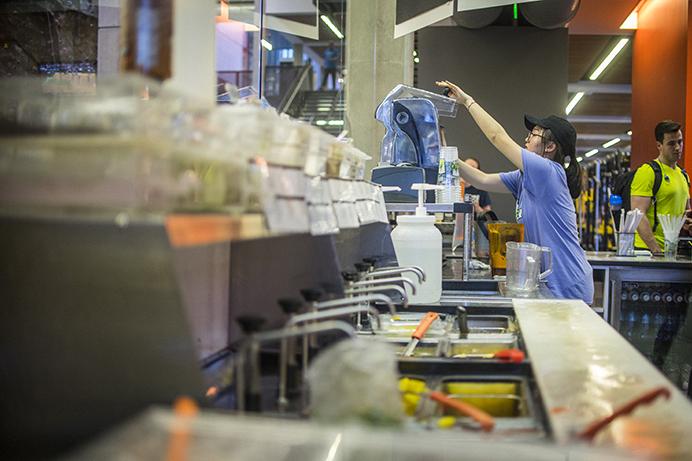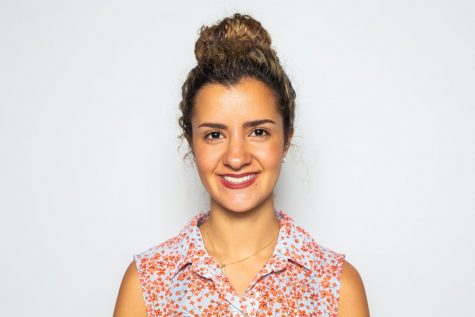Nadler: Sugar and spice, and everything natural
It is not sugar we should stay away from, it is added sugar we should become more aware of.
CRWC employee, Leyuan Li, makes smoothies at the Power Café on Wednesday, April 5, 2017.
November 28, 2018
As a child, I remember the feeling of excitement that ran through me when I got bribed to do a chore with the reward of candy. Nothing like 20 grams of sugar to get my little mind motivated.
Since I never stashed candy at my house growing up, such a “treat” seemed like a great privilege. Despite my love affair with candy when I was young, here I am, a 21-year-old college student, trying my best to stay away from any food with added sugar.
People should be more aware of the amount of added sugar in their food.
Added sugar consists of syrups and sugars that are mixed into processed foods. I have become mindful of added sugar in food since I began to notice how much extra sugar is sneaked into such products as pre-made pasta sauce and salad dressings. Personally, I can say that I feel much better physically and more mentally focused when there is less sugar in my diet.
Another example of sugars that sneak up on people is at the Campus Recreation & Wellness Center Power Café. The healthy fresh-fruit smoothies have numerous pumps of sugar in them, perhaps to mask the tart flavor of some fruits.
UI dietitian JoAnn Daehler-Miller said, “We are concerned about added sugar, not natural sugar.”
While fruits and natural foods will always organically have sugar in them, it is the extra sugar that is put in healthy products such as smoothies that is concerning.
RELATED: Point-counterpoint: Is candy corn delicious?
Daehler-Miller said, “Sugar is added to so many foods, so people consume high amounts of sugar, which is where our concerns are … a lot of sugar does not give us our feeling of fullness, so there is weight gain.”
Added sugars are increasing calorie intake, but they don’t contain nutrients. While Daehler-Miller does not recommend eliminating added sugar from one’s diet, because it increases desire, but she does recommend getting sugar from more foods with great nutrients, such as fruit.
Sugar additives in food make it easy to go over the recommended amount of sugar. According to the American Heart Association, men should take in 37.5 grams of sugar a day and women should take in 25 grams of sugar a day. Yet the average American consumes 82 grams of sugar every day, almost triple the advised amount. The culprit? Added sugar.
People know that they need to fulfill their cookie cravings in moderation, but not all realize that they need to watch their salad dressing and tomato sauce as well.
Today, Iowa ranks at No. 4 in the highest obesity rate among the 50 states. The rate is at a whopping 36.4 percent in 2017. In addition, 22.6 percent of people ages 18-25 are in the obese range. The numbers alone should deter us from consuming added sugars in our food.
While I think it is important to “treat oneself,” we should become more cognizant of the amount of sugar in our foods — especially hidden added sugars. It is easy to exceed the suggested amount of sugar intake, but becoming more aware of how much sugar we consume could help us stay in the suggested range of sugar consumption.





















